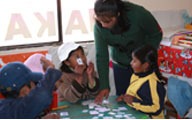
Improving Social and Productive Infrastructure
ACDI/VOCA fostered opportunities in Bolivia through the Integrated Community Development Fund (ICDF).
The seven-year USAID-funded program was launched in 2005 to create community and economic development opportunities in the Yungas and Tropics of Cochabamba (TC) regions. It was designed to meet basic human needs and alleviate poverty by improving social and economic conditions.
ICDF took a two-pronged approach:
- Strengthen community development through the introduction and improvement of social infrastructure and community participation.
- Strengthen economic development by providing new economic opportunities that create employment and generate income.
As of March 2011, 410 community development and 278 economic development projects were implemented. Of the 688 total, 580 were completed, creating 3,896 equivalent employments, training 41,252 people and benefiting 34,132 families in the two regions.
Community Development Programs
By March 2011, ICDF completed 322 community development infrastructure projects including schools, health centers, a footbridge, community centers and potable water and sewage systems.
Besides gaining infrastructure, communities benefited from training in protecting the environment, health and sanitation, and community and municipal strengthening. ICDF also operated a scholarship program for underprivileged students, affording those selected the chance to study at local, national and international universities. These investments responded to short-term community needs while ensuring sustainable, long-term community stability and development.
Economic Development Programs
ICDF economic development programs assisted with the development of business plans, supported academic exchanges, strengthened value chains, provided technical training, constructed productive transportation infrastructure and provided small grants to business owners. The 258 completed projects ranged from agriculture, beekeeping, poultry and animal husbandry to focusing on preserving the environment and tourism.
The economic development programs under ICDF affected change in a variety of areas, including introducing improved agricultural production techniques, building bus terminals and training business owners in accounting and financial management. All activities were implemented to improve the economic conditions of the communities in which they operate. As a consequence of economic growth, community members have greater access to resources, are less likely to emigrate and more likely to contribute to their respective communities. These combined effects strengthen communities and result in sustainable community development.
Community Contribution
As part of ICDF’s strategy, the communities and beneficiaries were required to invest in community and economic development initiatives. Their contributions come in many forms, from a citizen donating a few hours of time to dig ditches, to a local municipality contributing to a school’s construction cost, to a local business donating supplies for a community center. As of March 2011, ICDF registered almost $2.8 million in community contributions for community and economic development initiatives, with much more expected by the end of the program.
Volunteer Technical Assistance
An integral part of ACDI/VOCA’s approach, in Bolivia and worldwide, is the support of long-term programmatic initiatives with short-term technical assistance from volunteer experts. Assignments, which typically last between two and four weeks, are developed to meet specific community-identified needs. For ICDF this assistance included technical assistance on citrus, stevia (a sugar substitute) production, ecotourism and tropical animal health.
By March 2011, ICDF carried out 15 volunteer assignments devoted to both community and economic development. These assignments represent over $120,000 in donated time and benefitted over 14,000 community members.
ACDI/VOCA’s History in Bolivia
For over 38 years, ACDI/VOCA has been a leading provider of long- and short-term technical assistance in Bolivia, the poorest country in South America. To complement robust systemic projects, ACDI/VOCA volunteers and consultants have completed more than 500 technical assistance assignments in Bolivia in all aspects of agriculture, agribusiness and enterprise development.
Since 2001, ACDI/VOCA has implemented community development programs in Bolivia, beginning with the USAID-funded Yungas Community Alternative Development Fund (YCADF). This project improved the social and productive infrastructure of more than 200 communities throughout the Yungas region. Working with Bolivian partners, ACDI/VOCA provided or improved 55 potable water and sanitation systems, 38 schools, 12 agricultural processing facilities, 57 grants for agricultural production equipment and/or training, 13 roads or bridges and 2 regional bus terminals. Through training and technical assistance, ACDI/VOCA ensured each community’s ability to operate and maintain its infrastructure upon project completion. ICDF continues these efforts to affect change in the region.





